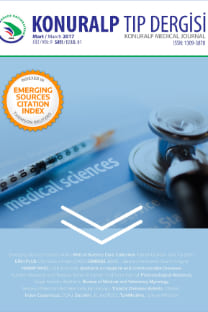Covid-19 Pandemi Sürecinde Sağlık Çalışanlarında Anksiyete ve Uyku Kalitesi
Covid-19, Pandemi, Koronavirüs Anksiyete Ölçeği, Pittsburg Uyku Kalitesi Ölçeği, Sağlık Çalışanlar
Anxiety and Sleep Quality in Healthcare Professionals During the Covid-19 Pandemic Process
Covid 19, Pandemic, Coronavirüs Anxiety Scale, Pittsburg Sllep Quality,
___
- 1. OECD Policy Responses to Coronavirus (COVID-19). The territorial impact of COVID-19: Managing the crisis across levels of government.Updated 10 November 2020 [Internet]. [Cited 2022 October 15]. Available from https://www.oecd.org/coronavirus/policy-responses/theterritorial-impact-of-covid-19-managing-the-crisis-across-levels-ofgovernment-d3e314e1/
- 2. Jahrami H, BaHammam AS, AlGahtani H, Ebrahim A, Faris M, AlEid K, et al S. The examination of sleep quality for frontline healthcare workers during the outbreak of Covid-19. Sleep Breath. 2021; 25 (1) :503-11. https://doi.org/10.1007/s11325-020-02135-9.
- 3. Jansen E. Why sleep is so important to your health. University of Michigan. School of public health. March 2, 2020 [Internet]. [Cited 2022 October 15]. Available from https://sph.umich.edu/pursuit/2020posts/why-sleep-is-so-important-to-your-health.html.
- 4. Badahdah AM, Khamis F, Al Mahyijari N. Sleep quality among health care workers during the COVID-19 pandemic. Journal of Clinical Sleep Medicine. 2020; 16(9): 1635
- 5. Labrague LJ, De los Santos JAA COVID‐19 anxiety among front‐line nurses: Predictive role of organisational support, personal resilience and social support. Journal of nursing management. 2020; 28(7): 1653-61.
- 6. Simonetti V, Durante A, Ambrosca R, Arcadi P, Graziano G, Pucciarelli G et al. Anxiety, sleep disorders and self‐efficacy among nurses during COVID‐19 pandemic: A large cross‐sectional study. Journal of clinical nursing. 2021; 30(9-10): 1360-71.
- 7. Evren C, Evren B, Dalbudak E, Topcu M, Kutlu N. Measuring anxiety related to COVID-19: A Turkish validation study of the Coronavirus Anxiety Scale. Death Stud. 2022; 46(5): 1052-8. https://doi.org/10.1080/07481187.2020.1774969
- 8. Buysse DJ, Reynolds III CF, Monk TH, Berman SR, Kupfer DJ. The Pittsburgh Sleep Quality Index: a new instrument for psychiatric practice and research. Psychiatry research. 1989; 28(2): 193-213.
- 9. Ağargün MY, Kara H, Anlar Ö. Pittsburgh Uyku Kalitesi İndeksi’nin geçerliliği ve güvenirliliği. Türk Psikiyatri Dergisi. 1996; 7(2): 107-15.
- 10. Qi J, Xu J, Li BZ, Huang JS, Yang Y, Zhang ZT et al. The evaluation of sleep disturbances for Chinese frontline medical workers under the outbreak of COVID-19. Sleep medicine. 2020; 72: 1-4. https://doi.org/10.1016/j.sleep.2020.05.023
- 11. Gao W, Ping S, Liu X. Gender differences in depression, anxiety, and stress among college students: a longitudinal study from China. Journal of affective disorders. 2020; 263: 292-300. https://doi.org/10.1016/j.jad.2019.11.121
- 12. Zhang B, Wing YK. Sex differences in insomnia: a meta-analysis. Sleep. 2006; 29(1): 85-93. https://doi.org/10.1093/sleep/29.1.85
- 13. Badellino H, Gobbo ME, Torres E, Aschieri ME. Early indicators and risk factors associated with mental health problems during COVID-19 quarantine: Is there a relationship with the number of confirmed cases and deaths?. The International Journal of Social Psychiatry. 2021; 67(5): 567-75. https://doi.org/10.1177/0020764020966020
- 14. Duran S, Erkin Ö. Psychologic distress and sleep quality among adults in Turkey during the COVID-19 pandemic. Prog Neuropsychopharmacol Biol Psychiatry. 2021 Apr 20;107:110254. doi: 10.1016/j.pnpbp.2021.110254. Epub 2021 Jan 22. PMID: 33485962; PMCID: PMC7825837.
- 15. Phua DH, Tang HK, Tham KY. Coping responses of emergency physicians and nurses to the 2003 severe acute respiratory syndrome outbreak. Academic emergency medicine. 2005; 12(4): 322-8. https://doi.org/10.1197/j.aem.2004.11.015
- 16. Su TP, Lien TC, Yang CY, Su YL, Wang JH, Tsai SL et al. Prevalence of psychiatric morbidity and psychological adaptation of the nurses in a structured SARS caring unit during outbreak: a prospective and periodic assessment study in Taiwan. Journal of psychiatric research. 2007; 41(1-2): 119-30. https://doi.org/10.1016/j.jpsychires.2005.12.006
- 17. Zhou Y, Yang Y, Shi T, Song Y, Zhou Y, Zhang Z et al. Prevalence and demographic correlates of poor sleep quality among frontline health professionals in Liaoning Province, China during the Covid-19 outbreak. Frontiers in psychiatry. 2020; 11: 520-1. https://doi.org/10.3389/fpsyt.2020.00520
- 18. Jehan S, Zizi F, Pandi-Perumal SR, Myers AK, Auguste E, Jean-Louis G, et al. Shift Work and Sleep: Medical Implications and Management. Sleep Med Disord. 2017;1(2):00008. Epub 2017 Oct 6. PMID: 29517053; PMCID: PMC5836745.
- 19. Franceschini C, Musetti A, Zenesini C, Palagini L, Scarpelli S, Quattropani MC, et al. Poor sleep quality and its consequences on mental health during the Covid-19 lockdown in Italy. Frontiers in psychology. 2020; 11: 3072-3. https://doi.org/10.3389/fpsyg.2020.574475
- 20. Targa ADS, Benítez ID, Moncusí-Moix A, et al. Decrease in sleep quality during COVID-19 outbreak. Sleep Breath. 2021; 25:1055–61 https://doi.org/10.1007/s11325-020-02202-1
- 21. Eyüpoğlu A, Ünlüoğlu İ, Bilgin M, Bilge U. Eskişehir Osmangazi Üniversitesi Tıp Fakültesi Araştırma Görevlisi Hekimlerin Uyku Kalitelerinin ve Uyku Kalitelerine Etki Edebilecek Faktörlerin Değerlendirilmesi. Osmangazi Tıp Dergisi. 2018; 41(4): 304-14. https://doi.org/10.20515/otd.410439
- ISSN: 1309-3878
- Yayın Aralığı: 3
- Başlangıç: 2009
- Yayıncı: Düzce Üniversitesi Tıp Fakültesi Aile Hekimliği AD adına Yrd.Doç.Dr.Cemil Işık Sönmez
Özcan BUDAK, Mehmet Sühha BOSTANCI, Osman KÖSE, Nermin AKDEMİR, Ahmet GÖKÇE, Serhan CEVRİOĞLU
Bulgaristan'da Birinci Basamak Sağlık Hizmetlerinde Reformlar - Geçmiş, Bugün, Gelecek
Yasemin OGUL, Veysel Atilla AYYILDIZ, Mustafa GÜZEL, Orhan AKPINAR, Hikmet ORHAN
Yaşar ÇATAL, Müge GÜNALP, Sinan GENÇ, Ahmet Burak OĞUZ, Ayça KOCA, Onur POLAT
Zeynep ERGENÇ, Özlem KARACA OCAK, Erkan AKSOY, Hasan ERGENÇ
Depresyonda ve Anksiyete Bozukluklarında Öz Şefkat
Betül KURTSES GÜRSOY, Ayşe Zeynep AKKOYUN
Berin TUĞTAĞ DEMİR, Dilara PATAT
Obez Hastalarda Vitamin B12 ve Vitamin D’ nin IL-4, IL-10, TNF-Beta ile İlişkisi
